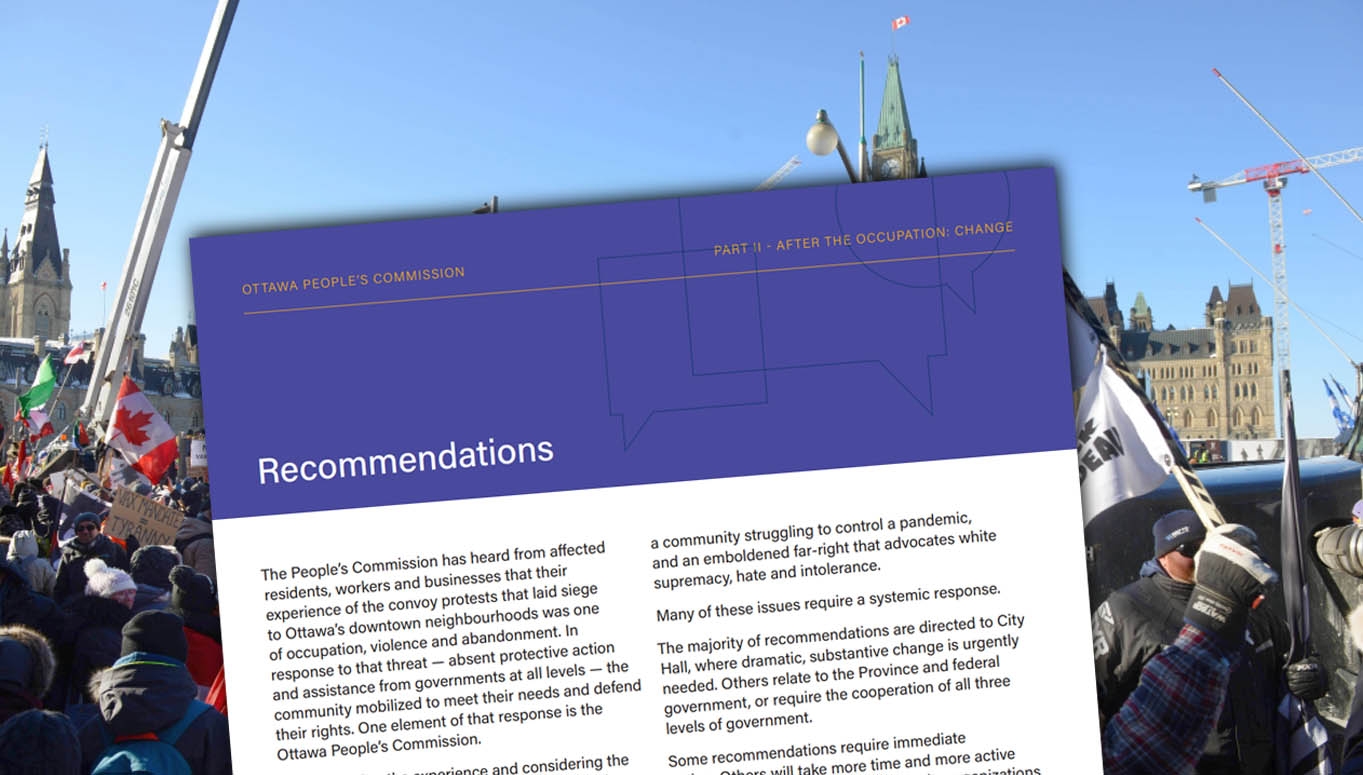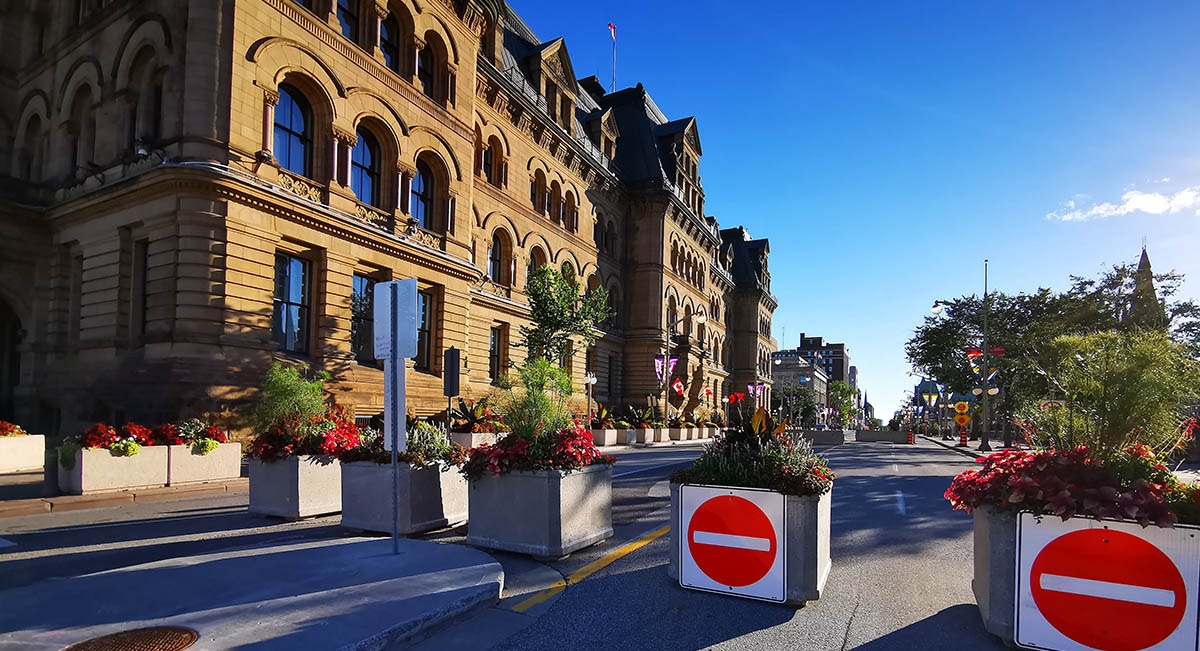
Ottawa People’s Commission hits and misses the target
ABOVE: The Ottawa People’s Commission, a grassroots group set up by the Centretown Community Health Centre, released part two of its report on the impacts of the 2022 “freedom convoy” protests.
The federal inquiry into the use of the Emergency Act released its findings in February 2023. It concluded that the federal government was justified in using the increased powers permitted under the act, but the inquiry did not address the impact of the occupational protest on the residents of Ottawa.
Throughout the 2022 “freedom convoy,” downtown residents complained that they felt abandoned by City of Ottawa officials, including law enforcement.
The Ottawa People’s Commission is a grassroots group set up by the Centretown Community Health Centre after the 2022 convoy protests. Its mission was to document the experiences of Ottawa residents during the protests.
Four commissioners were appointed, including Alex Neve, General Secretary of Amnesty International Canada from 2000-2020; Professor Monia Mazig from Carleton University; Debbie Owusu-Akyeeah, Executive Director at the Canadian Centre for Gender and Sexual Diversity; and Leilani Farha, the former UN Special Rapporteur on the Right to Housing who now works for the Shift, an international housing advocacy group. Of note, according to the commission’s website, only Alex Neve has a legal background.
Public hearings took place during the fall of 2022. The Ottawa People’s Commission set out to cover the experiences of all who testified while ensuring the representation of diverse groups, including LGBTQ2S, POC, and First Nations Canadians. The group’s first report was released in January 2023.
Councillors Glenn Gower and Ariel Troster brought forward a motion at the February 23, 2023, session of Council asking that Council approve posting the Ottawa People's Commission Report next to the Public Order Emergency Commission on the Disclosure of Executed Reports page on the City of Ottawa website. The motion was approved, giving the report Council’s stamp of approval.
The second report from the citizen-based commission focuses on how the city can rebuild trust between the municipal government and residents. Prior to the completion of the report, local activist groups, including Horizon Ottawa, advocated for City Council and the Ottawa Police Services Board (OSPB) to adopt the report. The newly released second report includes 25 recommendations with several sub-points.
Some recommendations appear to be based on the realities of the convoy. Recommendation 20 states the City of Ottawa should work with all levels of government to coordinate responses to crises and emergencies more effectively. The Federal Public Order Emergency Commission showed that this was indeed lacking. Recommendation 15 calls for a greater level of police oversight in the city, a sentiment that was echoed by the Auditor General’s Report into the Police Services Board’s conduct during the convoy occupation that was released earlier this year. However, that report noted that the province must ultimately reform the police, as this is not in the city’s mandate.
Other recommendations seem to be nothing more than wishful thinking. Recommendation 2 asks that all levels of government provide meaningful apologies to the residents of the city most affected, while Recommendation 3 suggests that the city redress grievances alongside the federal government by paying reparations for lost wages and “human rights abuses.”
Then there are recommendations unrelated to how a city should respond to a right-wing protest or public order emergency. Recommendation 5 asks that the city commits to the UN Declaration on the Rights of Indigenous People, stating: “Everything about the convoy occupation, including how it was organized, the conduct of participants, and the actions taken by governments and police, represented a wholesale failure to respect the rights of Indigenous Peoples in the city and, in particular, the rights of the Algonquin Anishnaabeg people, who have never ceded or surrendered these lands. That disrespect for the rights of Indigenous Peoples in Ottawa/Gatineau is longstanding and endemic.”
The horn honking, hot tubs, street parties, and cookouts were disrespectful to the citizens of Ottawa, but the organizers' intentions were directly tied to protesting the government’s Covid policies. Indigenous Peoples might have been included in the downtown residents who were negatively affected by the convoy, but they were not the target of the demonstrations.
Recommendation 22 is not rooted in the reality of municipal governance during the convoy. It states: “The City of Ottawa should redouble its commitment and improve its performance in boosting gender, racial and all other forms of diversity, to increase equity, inclusion, and accessibility within elected and senior levels of municipal government, as well as senior ranks of the Ottawa Police Service.”
While this recommendation may be full of good intentions, it’s important to note that Ottawa City Council was diverse during the convoy with Black councillors like OSPB member Rawlson King, former OPSB Chair Eli El-Chantiry, and LGBT members including Catherine McKenney. Heading the Ottawa Police Service at the time was a Black Canadian, Chief Peter Sloly, and the OSPB was chaired by Diane Deans. Recommendation 22 also overlooks that representatives in the Ottawa municipal government are democratically elected in highly competitive elections, sometimes with dozens of candidates in each ward.
While the commission’s report offers several solid recommendations on building trust between the City of Ottawa and its residents, several recommendations exist to push policy desires that have nothing to do with the convoy but are instead related to ongoing social issues in Canada.
The report does not come across as unbiased but rather as progressive. The suggested reparations will not proceed given the cash-strapped nature of all levels of government, not to mention the precedence that it would set.
The lack of a retired judge and the inclusion of only one legal professional on the commission forces one to believe that this report was produced as a document that genuinely echoes the delegates' voices at the public hearings. Some recommendations are solid, but others are simply not tenable at the municipal level, purely on a technical basis.
The Ottawa City Council could pass a motion to recognize this report, but it is unlikely that this document will be the fuel that fires the federal government to scrap the Indian Act (even though it needs to go).
The noise pollution, harassment, breakdown of law and order, and the failure in governance during the convoy are a stain on the fabric of our city, but if the city moves to recognize this report, it would be nothing more than a virtue signal.
To read the second report, click here.








